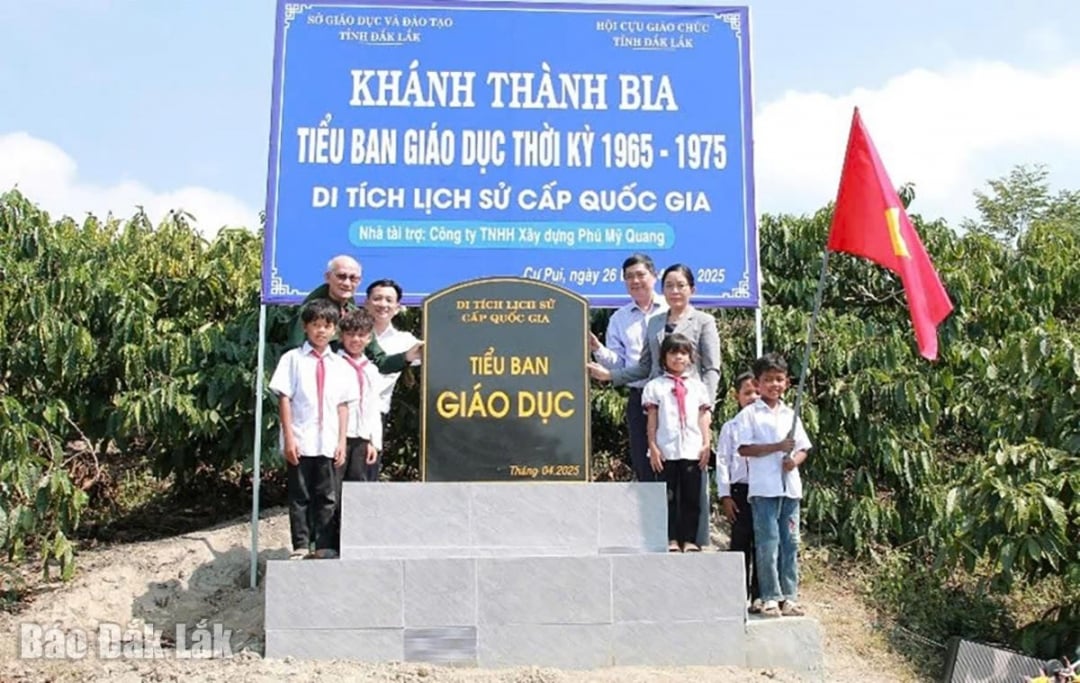During the period 1965-1975, the Education Subcommittee successfully developed a literacy campaign and primary education for ethnic minorities in the base areas and liberated communes; it also established a local education management network... Through this, teachers gradually preserved and contributed to building the foundation for the province's education sector.
Former teacher Nguyen Van De (village 6, Khue Ngoc Dien commune, Krong Bong district) recalls that education during the war was fraught with shortages but also filled with pride. There was a shortage of teachers, books, materials, chalk, and blackboards… Therefore, each teacher would teach from kindergarten to grade 3 and simultaneously teach 3-4 classes. Classrooms "sprung up" under the forest canopy, along stream banks, with desks made of bamboo, students using pointed sticks as pens and banana leaves as paper.
In those harsh conditions, the teachers came up with many innovative ways to overcome difficulties, but the most impressive was their method of saving paper: each page would be written on multiple times, from pencil to red pen to ink, finally dipped in water and dried to be written on again. The school was built in the forest, next to a cave so that when the enemy raided, the students could run into the cave to hide. At peak times, the enemy raided 2-3 times a year. The school was destroyed by bombs and bullets, so the teachers went deeper into the forest to find a new location, and together with the people, rebuilt the school and classrooms…
 |
| The monument dedicated to the Education Subcommittee has become a "red address" for educating future generations about revolutionary traditions. Photo: Thuy An |
Now 84 years old, veteran teacher Ha Ngoc Dao – a former official of the Dak Lak Education Subcommittee during that period – choked with emotion as he recalled that many teacher-soldiers fell while on duty at this memorial site. Along with other forces, during the 10 years of resistance, the Education Subcommittee made efforts to build a literacy campaign and develop primary education for ethnic minorities in the base areas and liberated communes in H1, H3, H10, H9, H5… The Subcommittee established an education management network in the aforementioned districts, and also built the Provincial Workers-Farmers Supplementary School, the Provincial Elementary Teacher Training School, and boarding schools for the children of martyrs and orphans. In particular, the Education Subcommittee also directed the writing and printing of materials in the Ede and M'nong languages for the people in the liberated areas and ethnic minority soldiers in the province to ensure the right to education for all citizens…
Representing the current generation of educators, the Director of the Department of Education and Training, Le Thi Thanh Xuan, expressed her deep gratitude to the previous generations of teachers and soldiers. She also affirmed that the National Historical Monument "Education Subcommittee during the period 1965-1975" is a "red address" for educating future generations about revolutionary traditions. The education sector will implement appropriate and specific programs to help students gain a deeper understanding of national and local history.
Source: https://baodaklak.vn/xa-hoi/202505/ve-noi-gieo-chu-thoi-lua-dan-cd811f5/













































































































Comment (0)